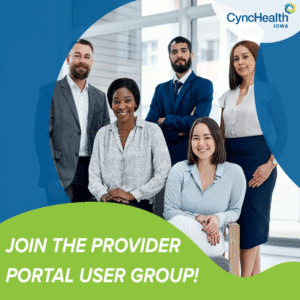Social needs have a direct impact on individual health and the healthcare system.
With discussions surrounding equity and social determinants of health further exacerbated by COVID-19, it is now more important than ever to build a social care ecosystem. Building this ecosystem is not easy and it requires resolve and resilience focusing on cross-sector partnerships.
Recently, Joanne Kenen wrote about the social care referral ecosystem for Politico’s The Fifty. The focus was on Unite Us, who’s service CyncHealth provides to healthcare participants and community-based organizations in Iowa, Kansas, Minnesota, Missouri, Nebraska, North Dakota, and South Dakota.
Dr. Jaime Bland, CyncHealth President & CEO, spoke about CyncHealth’s efforts in the Great Plains and talked about how her experiences as a nurse led the organization to add a SDOH referral platform to the health data utility.
Nebraska began looking for a broad social service referral platform back in 2018 and opened it in February 2020, “two weeks before we closed our offices,” said Jaime Bland, the CyncHealth CEO. Having built up a lot of patient record and data sharing capacity, “social care was the next logical step,” she said.
“Care coordinators take this on. They push out the needs to be met, cast a broad query” to community partners,” Bland said. “And someone [the client] isn’t sitting there while you try to make phone calls.”
“The workflow is much improved,” she added. “Everyone has one tool, they aren’t responding to multiple queries with multiple tools.”
While there are challenges, we’ve learned a few things along the way:
- Partnerships are critical to success. Our work with United Way of the Midland’s 2-1-1 has been critical to ensuring health systems can easily connect with community-based organizations.
- Focus on the community. Building trust and community buy-in is vital; hiring a program coordinator to be “boots on ground”, engaging with community-based organizations is vital.
- Health data utility exchange as home. When it comes to data, SDOH makes sense at the health data utility to ensure data is not siloed and community members’ needs are met, no matter where they access care.
- A willingness to innovate and be creative is an important skill set. SDOH work is not clearly road-mapped, and teams need to pave the way forward with this willingness in the forefront.
- Screening for social needs continues to present opportunity. This is why CyncHealth partnered with the National Association of Community Health Centers to build the PRAPARE tool into Unite Us to offer screening that matches resources to identified social needs.
As the spirit Kenen’s article notes, there’s a long way to go when it comes to addressing social needs and we are proud to be pushing solutions along with our partners and colleagues around the country.
Interested in learning more? Have a recommendation for improvement? Contact Dr. Joy Doll, jdoll@cynchealth.org.

